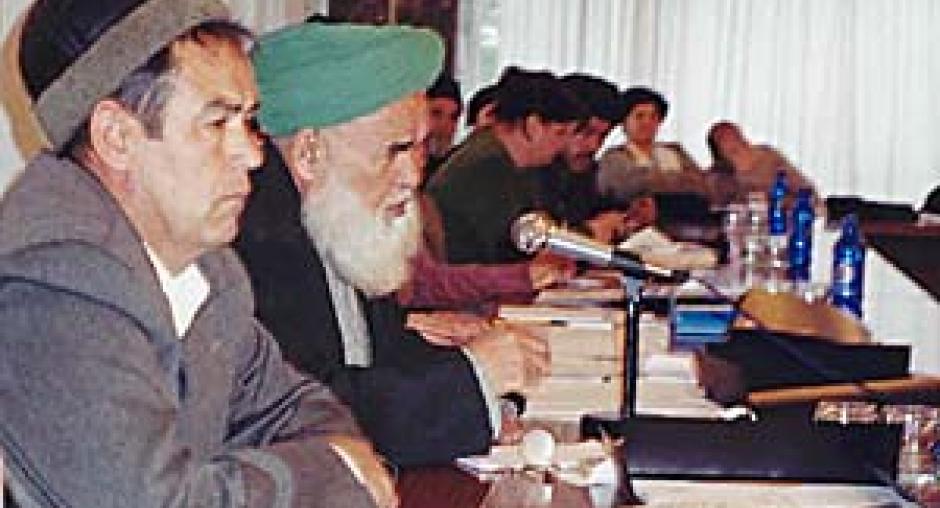Newsroom
Religious extremism and ways to respond it discussed at conference in Dushanbe
DUSHANBE 29 April 2002

(OSCE)Participants discuss freedom of religion at a round table meeting
organized by the OSCE and the Tajik Government, Dushanbe, 1
February 2002. (OSCE) Photo details
DUSHANBE, 29 April 2002 - Religious extremism, its roots and the conditions under which it grows were discussed in the conference "Combating Extremism and Strengthening Democratic Institutions: Problems and Prospects", held in Dushanbe on 25 April.
Organized by the OSCE Mission to Tajikistan in co-operation with the non-governmental organizations Research Centre Sharq, and the Friedrich Ebert Stiftung, main discussion topic at the conference was how to use and strengthen democratic institutions in countering the challenge of extremism.
As pointed out in the opening speech, the topic of extremism is important not because religious extremism constitutes the main problem to Tajikistan. However, in any society where unresolved social and economic problems exist, there always is a lure of extremism. Moreover, the challenge of extremist ideas creates a basic dilemma to any society. A democratic society is supposed to give its opponents the right to speak. At the same time society has the right to defend itself. This is a difficult balancing act.
The unique experience of Tajikistan in reconciliation of previously combating sides after the end of the civil war and in creating a basic national consensus was stressed. The Islamic Revival Party is the only legal Islamic party in the whole of Central Asia, and today it constitutes a constructive political force, which recognizes the constitutional system and law. A political dialogue within the context of democratic institutions between the government and a constructive political opposition was therefore pointed out by many speakers as a main means to prevent the growth of extremism. When people are able to freely express their demands and discontent, extremist ideas will lose their attraction. Extremism disguised in Islamic clothes constitutes a threat and a challenge not only to society in general, but to the Islamic community in particular. With regard to that kind of extremism several speakers pointed out that an ongoing dialogue within the Islamic community is the most effective means against extremism.
More than a hundred participants, among them religious and political leaders as well as government representatives from Tajikistan, heard presentations by scholars and specialists from Great Britain, Kyrgyzstan, Russia, Tajikistan, and Uzbekistan. A conference report will be published including both the presentations and the discussion.
Organized by the OSCE Mission to Tajikistan in co-operation with the non-governmental organizations Research Centre Sharq, and the Friedrich Ebert Stiftung, main discussion topic at the conference was how to use and strengthen democratic institutions in countering the challenge of extremism.
As pointed out in the opening speech, the topic of extremism is important not because religious extremism constitutes the main problem to Tajikistan. However, in any society where unresolved social and economic problems exist, there always is a lure of extremism. Moreover, the challenge of extremist ideas creates a basic dilemma to any society. A democratic society is supposed to give its opponents the right to speak. At the same time society has the right to defend itself. This is a difficult balancing act.
The unique experience of Tajikistan in reconciliation of previously combating sides after the end of the civil war and in creating a basic national consensus was stressed. The Islamic Revival Party is the only legal Islamic party in the whole of Central Asia, and today it constitutes a constructive political force, which recognizes the constitutional system and law. A political dialogue within the context of democratic institutions between the government and a constructive political opposition was therefore pointed out by many speakers as a main means to prevent the growth of extremism. When people are able to freely express their demands and discontent, extremist ideas will lose their attraction. Extremism disguised in Islamic clothes constitutes a threat and a challenge not only to society in general, but to the Islamic community in particular. With regard to that kind of extremism several speakers pointed out that an ongoing dialogue within the Islamic community is the most effective means against extremism.
More than a hundred participants, among them religious and political leaders as well as government representatives from Tajikistan, heard presentations by scholars and specialists from Great Britain, Kyrgyzstan, Russia, Tajikistan, and Uzbekistan. A conference report will be published including both the presentations and the discussion.
